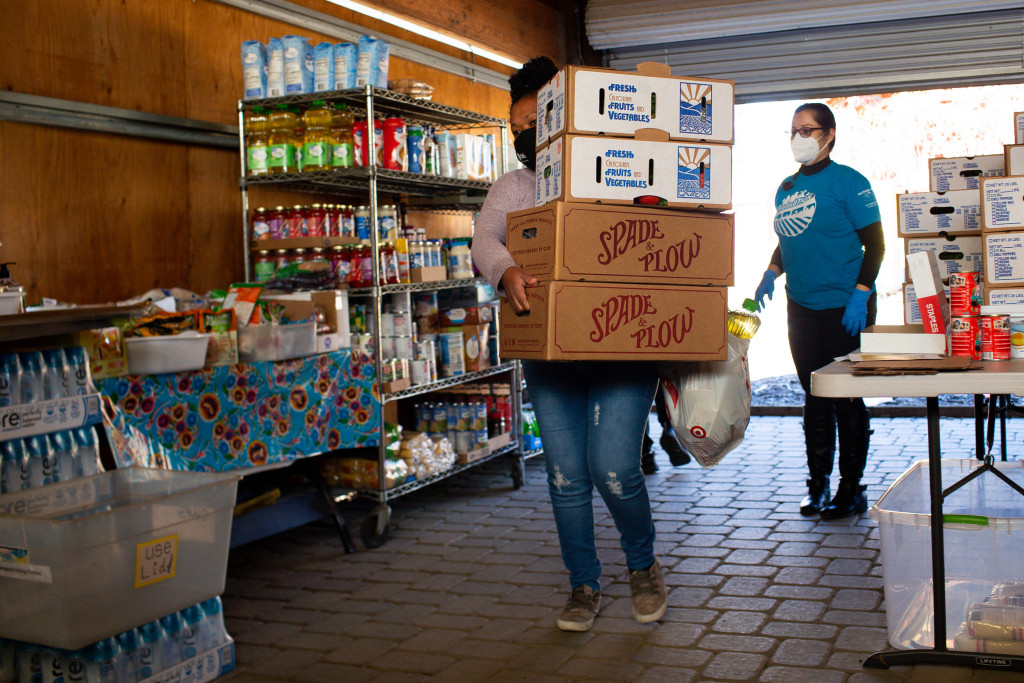When Adrianna Carranza got her $800 federal unemployment check Wednesday, she didn’t think it would be her last. Now, unless help materializes fast, she’s got one month to figure out how to pay rent — and put food on the table for her 5-year-old daughter.
“If it’s not with the stimulus, where am I going to find that money?” said Carranza, 28, who was laid off from her Peet’s Coffee job at the Oakland Airport and has been receiving biweekly help from the federal Pandemic Unemployment Assistance program. “I really got my hopes up. A lot of people got their hopes up.”
Across the Bay Area and the nation, millions braced for federal unemployment benefits to expire Saturday as President Donald Trump refused to sign a Congress-approved coronavirus relief package. The unemployment dollars have constituted another lifeline for Bay Area families thrown out of work during the pandemic; many were barely making it with two or three jobs in the first place.
Since shelter-in-place orders first closed down businesses in March, social service agencies have watched their client base widen to include families who had never before sought help. Food bank and pantry lines have ballooned as people relied on a mix of state unemployment funding and one-time stimulus checks of $1,200 and $600 — plus the weekly boost from the federal government, which for most ranged from $167 to $450.
Now, that money will disappear, rendering Bay Area families “just desperate” as they face down thousands of dollars in back rent with no relief in sight, said Marie Bernard, executive director of Sunnyvale Community Services. Federal benefits are funded through Dec. 31, but because payments are allocated weekly, the last was expected Dec. 26.
Nearly 750,000 Californians total are poised to lose out, the California Policy Lab projected in a recent report.
“By the point their checks came, people owed months of rent, had taken out loans at high interest rates, owed their friends and family,” Bernard said. “And now it’s going to stop?”
Nationwide, an estimated 12 million people will be cut off from aid, according to a report from the progressive think tank The Century Foundation. And in California, it couldn’t come at a worse time: Unemployment and layoffs have risen again throughout November and December after briefly dipping; last week, California made up nearly 23% of first-time unemployment claims in the U.S. despite constituting just 11% of the workforce.
The state’s unemployment rate in November was 7.9%, with several counties such as Los Angeles, Imperial and Colusa topping 10%, as compared to a rate of about 6.7% nationwide, according to the Economic Development Department and Bureau of Labor Statistics.
Not providing relief now will only draw out the state’s and nation’s economic recovery for longer, said Sylvia Allegretto, a labor economist and co-chair of the Center on Wage and Unemployment Dynamics at UC Berkeley.
“You’re really going to see not just the effect on individual people, families, children — the food insecurity and homelessness and increase in poverty — you’ll see the indicators on the economic bottom line, too,” Allegretto said. “What we don’t spend now will cost that much more in the future.”
Trump has demanded that Congress increase stimulus checks from $600 to $2,000 for eligible Americans — an abrupt proposal that blindsided lawmakers after they spent months negotiating the final package, and is opposed by many Republicans. He’s also complained about some of the items in the stimulus plan or in the omnibus spending bill.
In a tweet Saturday, reportedly from his Florida resort at Mar-a-Lago, the president wrote “I simply want to get our great people $2000, rather than the measly $600 that is now in the bill. Also, stop the billions of dollars in ‘pork.’ “
House Speaker Nancy Pelosi plans a full floor vote Monday on new legislation to codify the $2,000 payments. They could also vote on another stopgap measure to fund the government past the current spending deadline of midnight that day.
While that would avert a government shutdown if the Senate also passes it and the president signs it, it is still unclear what Trump plans to do with the larger pandemic relief and annual spending bill Congress passed Dec. 21.
Pelosi railed against the stalemate and the fact that Trump’s potential veto came after weeks of negotiations. “House and Senate Democrats have repeatedly fought for bigger checks for the American people, which House and Senate Republicans have repeatedly rejected – first, during our negotiations when they said that they would not go above $600 and now, with this act of callousness on the floor,” she said in a statement.
The looming uncertainty doesn’t help people like Carranza, who has started accumulating credit card debt for the first time in her life after getting laid off.
“This is not how we want to be going into the next year,” she said. “Just worried. Like, my God — I am going into debt.”
Bloomberg’s Chris Strohm and Billy House contributed to this report.










